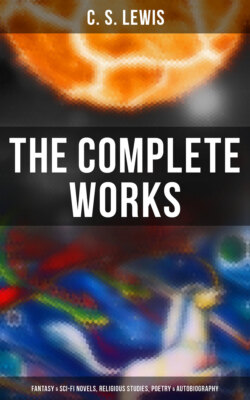Читать книгу The Complete Works: Fantasy & Sci-Fi Novels, Religious Studies, Poetry & Autobiography - C. S. Lewis - Страница 127
На сайте Литреса книга снята с продажи.
VI
ОглавлениеJane had gone into the garden to think. She accepted what the Director had said, yet it seemed to her nonsensical. His comparison between Mark’s love and God’s (since apparently there was a God) struck her nascent spirituality as indecent and irreverent. “Religion” ought to mean a realm in which her haunting female fear of being treated as a thing, an object of barter and desire and possession, would be set permanently at rest, and what she called her “true self” would soar upwards and expand in some freer and purer world. For still she thought that “Religion” was a kind of exhalation or a cloud of incense, something steaming up from specially gifted souls towards a receptive heaven. Then, quite sharply, it occurred to her that the Director never talked about Religion, nor did the Dimbles nor Camilla. They talked about God. They had no picture in their minds of some mist steaming upward: rather of strong, skilful hands thrust down to make and mend, perhaps even to destroy. Supposing one were a thing after all—a thing designed and invented by Someone Else and valued for qualities quite different from what one had decided to regard as one’s true self? Supposing all those people who, from the bachelor uncles down to Mark and Mother Dimble, had infuriatingly found her sweet and fresh when she wanted them to find her also interesting and important, had all along been simply right and perceived the sort of thing she was? Supposing Maleldil on this subject agreed with them and not with her? For one moment she had a ridiculous and scorching vision of a world in which God Himself would never understand, never take her with full seriousness. Then, at one particular corner of the gooseberry patch, the change came.
What awaited her there was serious to the degree of sorrow and beyond. There was no form nor sound. The mould under the bushes, the moss on the path, and the little brick border, were not visibly changed. But they were changed. A boundary had been crossed. She had come into a world, or into a Person, or into the presence of a Person. Something expectant, patient, inexorable, met her with no veil or protection between. In the closeness of that contact she perceived at once that the Director’s words had been entirely misleading. This demand which now pressed upon her was not, even by analogy, like any other demand. It was the origin of all right demands and contained them. In its light you could understand them: but from them you could know nothing of it. There was nothing, and never had been anything, like this. And now there was nothing except this. Yet also, everything had been like this: only by being like this had anything existed. In this height and depth and breadth the little idea of herself which she had hitherto called me dropped down and vanished, unfluttering, into bottomless distance, like a bird in space without air. The name me was the name of a being whose existence she had never suspected, a being that did not yet fully exist but which was demanded. It was a person (not the person she had thought) yet also a thing—a made thing, made to please Another and in Him to please all others—a thing being made at this very moment, without its choice, in a shape it had never dreamed of. And the making went on amidst a kind of splendour or sorrow or both, whereof she could not tell whether it was in the moulding hands or in the kneaded lump.
Words take too long. To be aware of all this and to know that it had already gone made one single experience. It was revealed only in its departure. The largest thing that had ever happened to her had, apparently, found room for itself in a moment of time too short to be called time at all. Her hand closed on nothing but a memory, and as it closed, without an instant’s pause, the voices of those who have not joy rose howling and chattering from every corner of her being.
“Take care. Draw back. Keep your head. Don’t commit yourself,” they said. And then more subtly, from another quarter, “You have had a religious experience. This is very interesting. Not everyone does. How much better you will now understand the Seventeenth Century poets!” Or from a third direction, more sweetly, “Go on. Try to get it again. It will please the Director.”
But her defences had been captured and these counter-attacks were unsuccessful.
